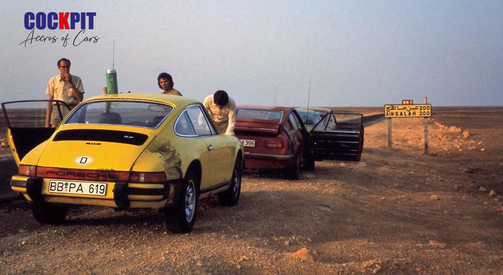Porsche 928 development tests passed through Algeria
- COCKPIT

- Oct 12, 2023
- 3 min read
Updated: Mar 28, 2025
Porsche has always had a limited range. So when Porsche develops a new model, it puts great resources into development. The 928 being the perfect example, released at the 1977 Geneva Motor Show, it had to go through multiple very severe tests to refine the new chassis as well as the brand's first V8 engines. Code name of the project “Projekt 928”, after internal development which required the most modern means of the time, for the model which was to make us forget the hegemony of the 911 over the brand.
“Environmental tests cannot be carried out only in laboratories,” explains former development engineer and Porsche driver Peter Falk. “They must take place in real conditions, because the customer must be able to rely on their vehicle in all situations, no matter how extreme.
The external tests will also be demanding and will require the use of what we call in the automotive world: mules (test vehicles which are different than the initial model and which contain the technologies of this one). this, in other words a camouflage to keep the secret of the future model).

So development mules called 'V-car' - which included a Mercedes-Benz 350SL R107, an Opel Admiral and three Audi 100 Coupés, had been used to test the running gear of the 928 prototype, and this had place in these extremes. But it was the arrival in 1974 of the complete 928 “W-car” prototype that marked the start of environmental testing of the final product, the W3 prototype, technically, with the exception of the rear axle, was almost a vehicle in series, which in camouflaged form (with foam coverings) was tested in Algeria and on the roads of Germany.
'The 928 test was carried out in parallel with the 911, to establish comparisons and bring the 928 to the same high level of quality'
“The 911 had the famous air-cooled engine – a special part of that car – but of course the water-cooled unit in the 928 was new to Porsche at the time,” Falk recalls. “The development team worked with the customer service team to build a testing regime specific to the 928.”
As such, every Porsche product has had to undergo a rigorous development and testing program. Over the years this had come to include those in extreme environments, which complemented the standard tests carried out on European roads and tracks.
'Over the summer these were carried out in Algeria - extreme heat up to 50 degrees Celsius, plus the possibility of prolonged high speed due to low traffic volume - and in the southern states United States, where temperatures were high in combination with high humidity and less speed, more stop-and-go traffic.
In winter, the tests were carried out in temperatures down to -40 degrees Celsius on snow and ice in northern Finland, Sweden and Canada.

In terms of implementation testing and ongoing repairs, improvisation was the norm - as were short films. The 928 surfs the sand in the Algerian desert in 1977. Crew facilities were basic and the demands placed on men and vehicles were extreme.

'The 928 test was carried out in parallel with the 911, to establish comparisons and bring the 928 to the same high level of quality.'

It all seems so simple, but some statistics demonstrate the effort the project team put into achieving this: 19 experimental test stands and prototype cars built, six crash test cars built, approximately 600,000 actual miles driven on the test tracks in Weissach and Ehra, and all other road surfaces in all environments, as well as on chassis dynamometers.
'As a developer and part of the project, I knew that we had developed an exceptional vehicle, which perhaps did not have the sporty character of a 911, but which represented an excellent, comfortable and fast car for traveling - this is still the case with the Porsche 928 today as a classic car.

Porsche undertook four expeditions to Algeria during the development of the 928, combining rolling test vehicles and prototypes. Here, these are tested in conjunction with the 911 and other reference cars.




















































Comments